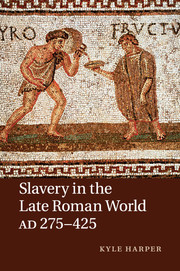Book contents
- Frontmatter
- Contents
- List of tables
- Acknowledgments
- PART I THE ECONOMY OF SLAVERY
- PART II THE MAKING OF HONORABLE SOCIETY
- PART III THE IMPERIAL ORDER
- Introduction
- 9 Citizenship and civil conflict: slave status after the Antonine Constitution
- 10 The enslavement of Mediterranean bodies: child exposure and child sale
- 11 The community of honor: the state and sexuality
- 12 Rites of manumission, rights of the freed
- CONCLUSION
- APPENDIXES
- Bibliography
- Index
9 - Citizenship and civil conflict: slave status after the Antonine Constitution
Published online by Cambridge University Press: 05 August 2011
- Frontmatter
- Contents
- List of tables
- Acknowledgments
- PART I THE ECONOMY OF SLAVERY
- PART II THE MAKING OF HONORABLE SOCIETY
- PART III THE IMPERIAL ORDER
- Introduction
- 9 Citizenship and civil conflict: slave status after the Antonine Constitution
- 10 The enslavement of Mediterranean bodies: child exposure and child sale
- 11 The community of honor: the state and sexuality
- 12 Rites of manumission, rights of the freed
- CONCLUSION
- APPENDIXES
- Bibliography
- Index
Summary
ROMAN LAW BEYOND ROME
Late in the third century, the Greek rhetor Menander of Laodicea composed a handbook on oratory. He advised the rhetor praising a city to laud all the traditional elements of civic vanity: architecture and athletic victories, festivals and favorite sons. The formula had centuries of Greek antiquity behind it, but in one respect times were changing. “In matters of state,” he wrote, “one considers whether the city fastidiously observes the customs and affairs of law, such as inheritances and female succession to property. But this aspect of praise is now obsolete, since the laws of the Romans are used by all.” Though he did repeat the point, this was more than the wistfulness of a hidebound scholar. Menander was witness to the passing of an age. The third century saw the immemorial pluralism of the Mediterranean give way, in the field of law, to the universalizing impulses of the Roman state. Hundreds of cities, each with its own local traditions, lost their prerogative to regulate the inevitable dangers of social living in antiquity. Inheritance disputes, paternal power, forms of female tutorship, slave-holding – all came progressively under the compass of Roman civil law.
The roots of this transformation lay in ad 212, when the Roman emperor Caracalla felt moved to honor the gods by extending Roman citizenship to virtually all free inhabitants of the empire. While the spread of Roman citizenship had been ongoing for centuries, universal citizenship was a watershed.
- Type
- Chapter
- Information
- Slavery in the Late Roman World, AD 275–425 , pp. 367 - 390Publisher: Cambridge University PressPrint publication year: 2011



